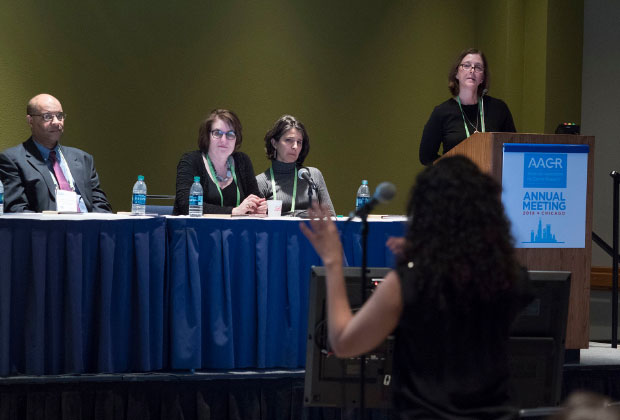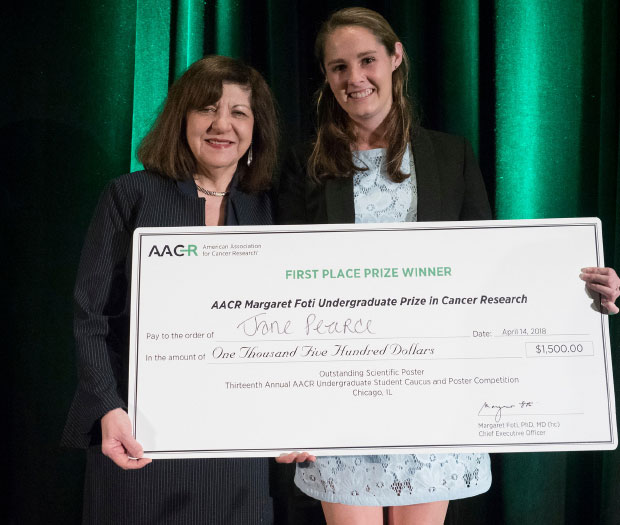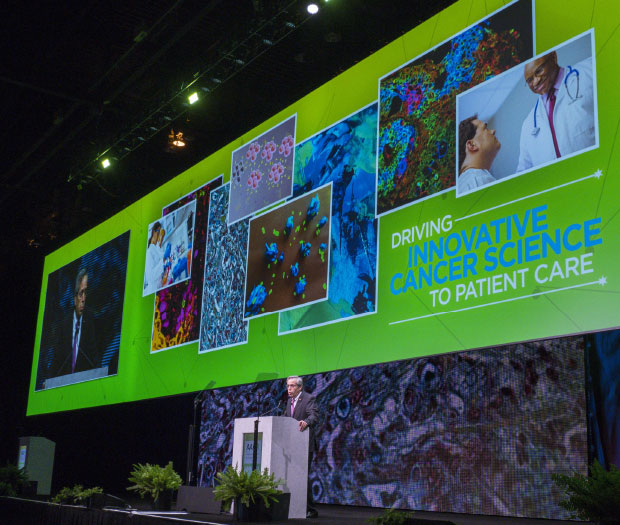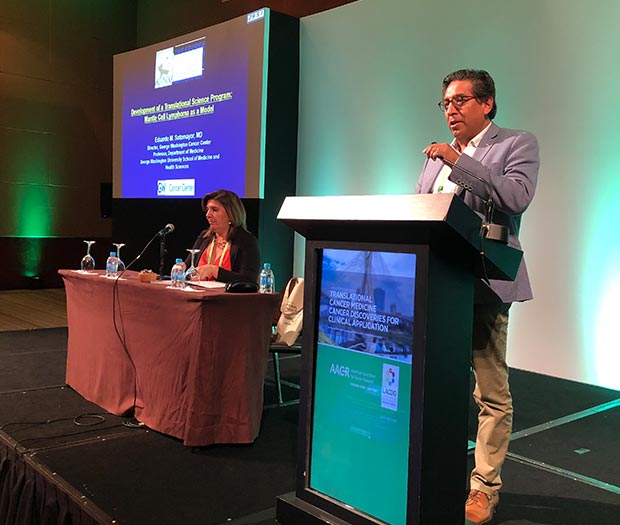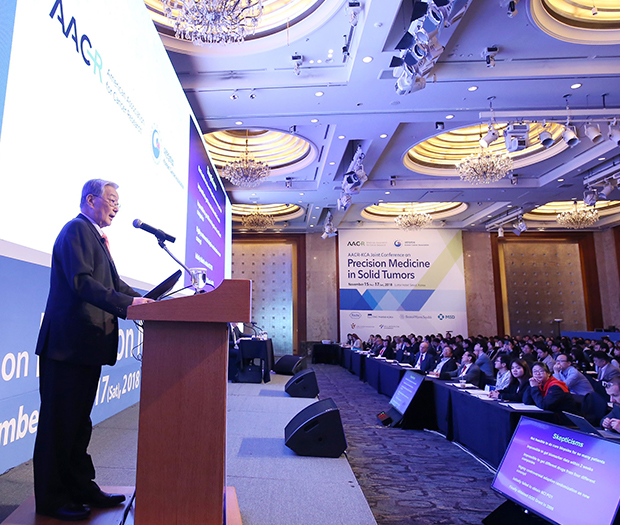Scientific
Leadership:
Catalyzing
Collaborations
The AACR identifies the challenges facing cancer scientists and clinicians; assembles leaders in various fields to address those challenges; and works with academic, industry, and government institutions to implement solutions that drive progress against cancer.
AACR Project GENIE: Powering Precision Medicine
As the founder of Project GENIE (Genomics Evidence Neoplasia Information Exchange), the AACR is working to deliver on the promise of precision medicine. Built upon data sharing between the world’s leading cancer centers, AACR Project GENIE is an international cancer registry that aggregates clinical-grade tumor sequencing data with limited clinical data to build virtual cohorts of patients on whom detailed outcomes data can be retrieved. By offering insights into the relationships between genotype and patient outcome, the project powers translational and clinical research—facilitating the development of new therapies, informing the design of better clinical trials, and improving clinical decision-making for the benefit of all cancer patients.
The increasing momentum of AACR Project GENIE over the past year was reflected in the number of institutions expressing interest in joining the consortium, which more than doubled in size in 2018 as 11 new participating organizations joined the eight founding participants (right). The expansion of the consortium was accompanied by an expansion of the data set, as releases in January and July increased the number of sequenced tumors by more than 50 percent. AACR Project GENIE is now one of the largest fully public cancer genomic datasets, with more than 48,000 de-identified genomic records covering more than 80 cancer types.
In February 2018—one year after the release of the first data set—members of the consortium published a paper in the journal JCO Clinical Cancer Informatics that detailed the genesis of the project and shared the perspectives of the founding institutions. The paper, which was intended to share best practices and serve as a guide for other organizations who wish to develop their own genomic data-sharing consortia, was among the most read articles in the journal in July 2018.
AACR Project GENIE is also supporting the “2020 by 2020” Presidential initiative and collaboration. Announced in March 2018, this initiative from AACR President (2017-2018) Michael A. Caligiuri, MD, FAACR, will perform genomic sequencing of both tumor and normal tissue from 2,020 consented African-American cancer patients by the year 2020 and aggregate this valuable information with clinical data from these patients. The genomic data will be made publicly available through the Project GENIE registry and the Oncology Research Information Exchange Network (ORIEN) to benefit researchers who are studying cancer and cancer outcomes in African-American populations with the goal of addressing this serious public health challenge.
AACR Think Tank on Cancer Health Disparities
One of the major goals of Dr. Caligiuri’s presidential year was to confront and overcome the challenges of cancer health disparities. A major step toward reaching this ambitious goal was the formation of an AACR Think Tank on Cancer Health Disparities. Under the leadership of chair John D. Carpten, PhD, and cochairs Marcia R. Cruz-Correa, MD, PhD, Brian M. Rivers, PhD, MPH, and Sanya A. Springfield, PhD, the think tank met in Washington, DC, in October to address three critical elements of the cancer disparities problem: 1) increasing participation of underrepresented/minority patients in clinical trials; 2) developing key resources to accelerate cancer health disparities research; and 3) training the cancer health disparities workforce to meet emerging needs. Participants in the think tank meeting included James W. Lillard, PhD, MBA, associate dean for Research at Morehouse School of Medicine and principal investigator of the 2020 by 2020 Initiative; and 2018-2019 AACR President Elizabeth M. Jaffee, MD, FAACR.
| AACR Project GENIE |
|---|
| Founding Consortium Participants |
| Dana-Farber Cancer Institute, Boston, Massachusetts |
| Gustave Roussy Cancer Campus, Paris-Villejuif, France |
| The Netherlands Cancer Institute, Amsterdam, on behalf of the Center for Personalized Cancer Treatment, Utrecht, The Netherlands |
| Memorial Sloan Kettering Cancer Center, New York, New York |
| Princess Margaret Cancer Centre, Toronto, Ontario, Canada |
| The University of Texas MD Anderson Cancer Center, Houston, Texas |
| Vanderbilt-Ingram Cancer Center, Nashville, Tennessee |
| New Consortium Participants |
| Children’s Hospital of Philadelphia Cancer Center, Philadelphia, Pennsylvania |
| Cancer Research UK Cambridge Centre, University of Cambridge, Cambridge, England |
| Duke University (Duke Cancer Institute), Durham, North Carolina |
| Herbert Irving Comprehensive Cancer Center, Columbia University, New York, New York |
| Swedish Cancer Institute, Seattle, Washington |
| Providence Cancer Institute, Portland, Oregon |
| Wake Forest University Health Sciences, Winston-Salem, North Carolina |
| The University of Chicago Comprehensive Cancer Center, Chicago, Illinois |
| University of California-San Francisco Helen Diller Family Comprehensive Cancer Center, San Francisco, California |
| Vall d’Hebron Institute of Oncology, Barcelona, Spain |
| Yale Cancer Center, New Haven, Connecticut |
AACR Pathology Task Force
Recognizing the vital role that pathologists play in delivering timely and accurate diagnoses to support the most effective treatment decisions, the AACR convened a Pathology Task Force in December to identify ways the association can better serve the field. Chaired by Massimo F. Loda, MD, the task force gathered thought leaders and stakeholders in academia, industry, and government to survey the challenges facing the field of cancer pathology and to develop innovative solutions to those challenges for the benefit of cancer patients.
Cancer Prevention Summit: White Paper on the Future of Cancer Prevention
In February 2016, the AACR convened a three-day Cancer Prevention Summit, bringing together nearly 70 scientists, clinicians, patient advocates, and funders to set a course for future efforts in cancer prevention research. In December, under the leadership of chairs Ernest T. Hawk, MD, MPH, and Scott M. Lippman, MD, the summit participants published a white paper in the AACR journal Cancer Prevention Research titled “Shaping the Future of Cancer Prevention—A Roadmap for Advancing Science and Public Health.”
Scientific
Working
Groups
AACR scientific working groups facilitate progress against cancer through collaboration. By building communities around areas of scientific interest, the AACR aligns the efforts of its members to address the most challenging questions in cancer research.
Pediatric Cancer Working Group (PCWG): Facilitating International Cooperation and Coordination
While the AACR’s PCWG works to address the scientific challenges facing the pediatric cancer field, the group also addresses the logistical challenges that hinder progress for children with cancer. One such challenge was a lack of coordination between two of the largest pediatric cancer drug development consortia, the NCI Pediatric Preclinical Testing Consortium (PPTC) in the United States and the Innovative Therapies for Children with Cancer (ITCC) Pediatric Preclinical Proof-of-Concept Program (P4) in Europe. These consortia bring together scientists, clinicians, regulators, and patients to develop novel pediatric cancer therapies. To maximize the impact of critical research resources, it is imperative that the organizations avoid duplication of effort. Leveraging its international membership and the AACR’s reputation as an honest broker, PCWG began acting as an intermediary between these consortia in 2018, aligning their efforts to accelerate the pace of progress against pediatric cancer. At the AACR Annual Meeting 2018, the PCWG brought the consortia together for a special session to discuss the preclinical models they have developed, the therapeutic agents they are currently testing, and opportunities to collaborate for the benefit of pediatric cancer patients worldwide.
RADIATION SCIENCE AND MEDICINE (RSM): NEW CHALLENGES, NEW COLLABORATIONS
The mission of the AACR’s Radiation Science and Medicine Working Group (RSM) is to foster the application of radiation science and medicine to understand and treat cancer malignancies. In June, RSM advanced that mission by hosting a think tank on Illuminating Technological Advances and Challenges in Precision Radiotherapies. Supported in part by Bayer Pharmaceuticals, the think tank convened more than 30 experts in all areas of radiation science—including radiobiology, medical physics, and nuclear medicine—to highlight current and emerging radiotherapy technologies, address the critical needs of the field, and discuss the most effective approaches to improving patient care.
Preventing and curing cancer through collaboration is one of the pillars of the AACR mission, and RSM joined forces with two other scientific organizations in 2018 to advance that mission:
- A major concern among clinicians is the lack of cancer drugs intended specifically for use with radiation therapy. In February, the AACR partnered with the Food and Drug Administration (FDA) and the American Society for Radiation Oncology (ASTRO) to host a regulatory science and policy workshop on Clinical Development of Drug-Radiotherapy Combinations. The workshop brought together regulators with academic and industry scientists to identify the drug development challenges and to develop a strategy to overcome them.
- In March, the AACR worked with the Radiation Research Society (RRS) to cohost a workshop on Targeting Cancer Metabolism to Improve Radiotherapy that explored the critical interface between tumor metabolism and radiotherapy response. Chaired by Julie Schwarz, MD, PhD, Douglas Spitz, PhD, and David Gius, MD, PhD, the workshop gathered radiobiologists, radiologists, and radiation oncologists to share the program with basic scientists focused on tumor metabolism.
- The AACR and ASTRO collaborated again to host a workshop on Targeting the Tumor Microenvironment in Radiation Oncology in July. The meeting—which was chaired by Wendy Woodward, MD, PhD, and Amato Giaccia, PhD—addressed critical topics such as tumor stromal effects on radiosensitivity and radioresistance, immune response to radiotherapy, and the effect of metabolism on the tumor microenvironment and the efficacy of radiotherapy efficacy.
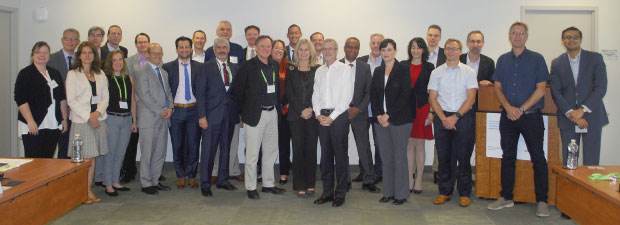
MOLECULAR EPIDEMIOLOGY WORKING GROUP (MEG): ADDRESSING CANCER HEALTH DISPARITIES
At the AACR Annual Meeting 2018, MEG worked with the AACR Minorities in Cancer Research (MICR) Council to present an inaugural joint symposium on “Aggressive Cancer Phenotypes in Racial/Ethnic Minority Populations: Opportunities and Challenges.” Moderated by MICR Council Chair-Elect Laura Fejerman, PhD, and MEG Steering Committee Chair Melissa L. Bondy, PhD, the session addressed the greater susceptibility of different minority populations to aggressive forms of cancer.
